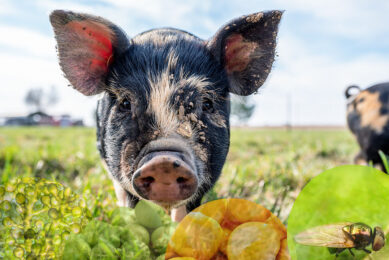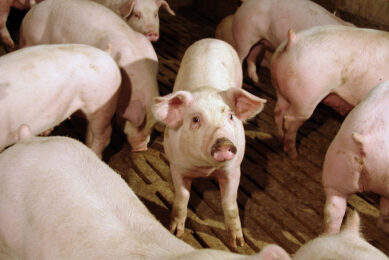Study: Nutritional value of canola oil co-products when fed to pigs

Rapeseed and canola are popular oilseed crops and co-products from these crops are increasingly used in livestock diets as a source of protein. Research at the University of Illinois is helping to determine the nutritional value of canola oil co-products fed to pigs.
“Breeding programmes in North America and Europe have focused on selecting varieties of canola and rapeseed with low concentrations of erucic acids and glucosinolates,” said Hans H. Stein, professor of animal sciences at the U of I. “We wanted to compare the co-products from the North American and European varieties, as well as determine effects of processing on the nutritional value of the co-products.”
Rapeseed that is low in erucic acid and glucosinolates is referred to as 00-rapeseed in Europe and canola in North America. Removing the oil from rapeseed via solvent extraction, results in 00-rapeseed (or canola) meal, and removing the oil via expeller extraction, results in 00-rapeseed expellers. Stein and his team tested canola meal from North America, 00-rapeseed meal from Europe, and 00-rapeseed expellers from Europe.
In one experiment, they determined the digestibility of amino acids in the three products. There was no difference in amino acid digestibility between canola meal and 00-rapeseed meal, with the exception of valine, cysteine, and glutamic acid.
In a second experiment, concentrations of digestible and metabolisable energy in the three coproducts were determined. As with amino acid digestibility, no difference in energy concentrations between canola meal and rapeseed meal was observed.
“The chemical composition of the seeds from plants grown in Europe and North America doesn’t appear to differ despite their different origins.” Stein said.
However, differences between 00-rapeseed meal and 00-rapeseed expellers were observed. All amino acids except threonine, tryptophan, and glycine were more digestible in 00-rapeseed expellers than in 00-rapeseed meal. The mean digestibility of all amino acids was 71.9 percent in 00-rapeseed meal and 74.4 percent in 00-rapeseed expellers. Also, 00-rapeseed expellers contained 7.6 percent more digestible energy and 7.7 percent more metabolizable energy than 00-rapeseed meal.
Stein said that the differences in amino acid digestibility and energy concentration were due to the oil remaining in the 00-rapeseed expellers after processing. “Expeller extraction is less efficient at removing oil than solvent extraction so the 00-rapeseed expellers contained more fat than the meals,” he said. “Fat contributes energy to the diets, and it also slows passage of digesta in the intestinal tract, which allows for more absorption of amino acids.”
Stein also cited possible heat damage in processing as a factor that might have reduced amino acid digestibility in 00-rapeseed meal.
Both studies were recently published in the Journal of Animal Science. The energy study, “Digestibility of energy and detergent fiber and digestible and metabolizable energy values in canola meal, 00-rapeseed meal, and 00-rapeseed expellers fed to growing pigs,” was co-authored by Tanawong Maison and Yanhong Liu of the University of Illinois.
Join 26,000+ subscribers
Subscribe to our newsletter to stay updated about all the need-to-know content in the feed sector, three times a week. Beheer
Beheer









 WP Admin
WP Admin  Bewerk bericht
Bewerk bericht